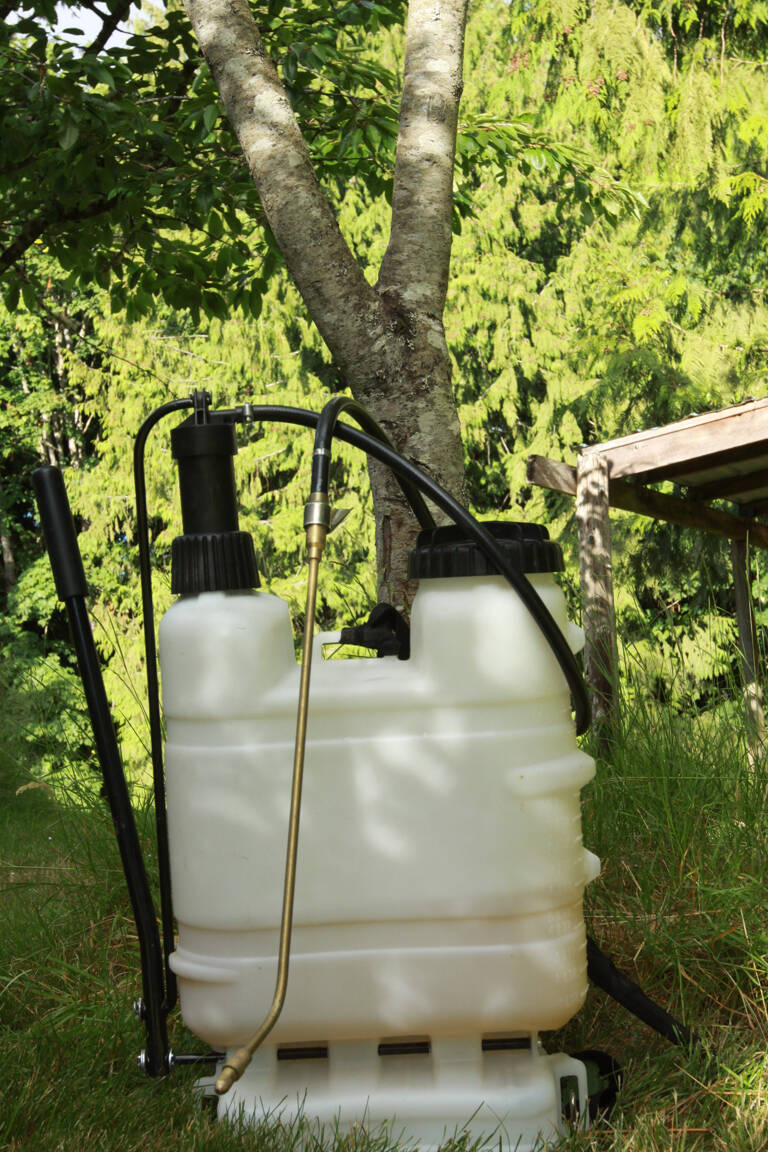Although small in size, insects and mites can affect the health and productivity of your fruit trees and berry bushes. If you have had problems with these pint-sized pests, consider using horticultural oils this winter and/or spring to control them.
Horticultural oils are used during the dormant season (that is, in the winter when deciduous plants shed their leaves and stop actively growing) to control over-wintering insect pests, eggs and mites.
Horticultural oils, usually applied to your plants as a spray, kill soft-bodied and slow-moving insects, overwintering eggs and mites by suffocation. They also penetrate the outer skins of insect and mite eggs, decreasing the number that hatch.
Run-of-the-mill oils can harm plants because they contain toxic impurities such as sulfur and block carbon dioxide exchange, which is important for photosynthesis.
However, horticultural oils are highly refined and contain at least 95 percent pure oil. When used as directed, horticultural oils rarely cause plant damage.
There are a number of reasons to use horticultural oils instead of other forms of pesticides on your fruit crops.
• Horticultural oils have very little effect on birds, humans, or other mammals. The excess oil evaporates quickly, so there is no toxic residue.
• Susceptible insects or mites are unlikely to develop resistance to these oils.
• Use during the dormant season has limited effects on beneficial insects that are unlikely to be active at that time.
• Horticultural oils are relatively inexpensive (when compared to other pesticides).
On the downside, horticultural oils do not control all pests and diseases that affect fruit crops. They will not control apple maggot, codling moth, or pear slug. They will not control apple scab or brown rot of stone fruit.
They are effective, however, in decreasing populations of most aphids, leaf rollers, tent caterpillars, scale and mites.
If horticultural oils sound right for your orchard, here are some tips for applying them during the dormant season. Apply horticultural oils just before leaf and flower buds show signs of breaking open. This is when insect pests become more active and are breathing.
Be sure to spray all parts of the tree or bush including cracks and crevices, limb stubs left behind from pruning, and the V-shaped crotch where limbs branch out from the trunk.
Do not apply horticultural oils during freezing weather because oil coverage will be uneven and the oil water mixture may separate. Temperatures between 40-80 degrees for 24 hours are recommended for application of dormant oils. Do not apply horticultural oils if it is wet or rain is likely because these conditions inhibit oil evaporation and can result in plant injury.
Avoid unintended spray drift onto other plants since many herbaceous and some woody plants are sensitive to horticultural oils. (See sidebar.)
Even though horticultural oils are safe, they are pesticides. If you use horticultural oils, be sure to read the label before you use them and follow the instructions!
Bob Cain is a Clallam County Master Gardener.
Plants sensitive to horticultural oils
Do not use horticultural oils on the following plants. Use of horticultural oils on these plants can result in blackened branches, yellowing foliage and even plant death:
Annual flowers
Black walnut
Cryptomeria
Douglas-fir
Hickories
Junipers and cedars
Maples (particularly Japanese and red maple)
Redbud
Smoke tree
Spruce (particularly dwarf Alberta spruce)
‘Permaculture and the Garden’
Make sure to join us for the upcoming Green Thumb presentation, “Permaculture and the Garden,” presented by Delvin Solkinson, from noon-9 p.m. Thursday, April 28, on Zoom. Solkinson is a community gardener, student, and teacher from British Columbia. Presentations cover basic gardening topics relevant to most home gardeners. Seminars are free, but donations to help support the WSU Clallam County Extension Master Gardener program or Master Gardener Foundation of Clallam County are appreciated. Get the Zoom link at extension.wsu.edu/clallam/master-gardener-calendar.


